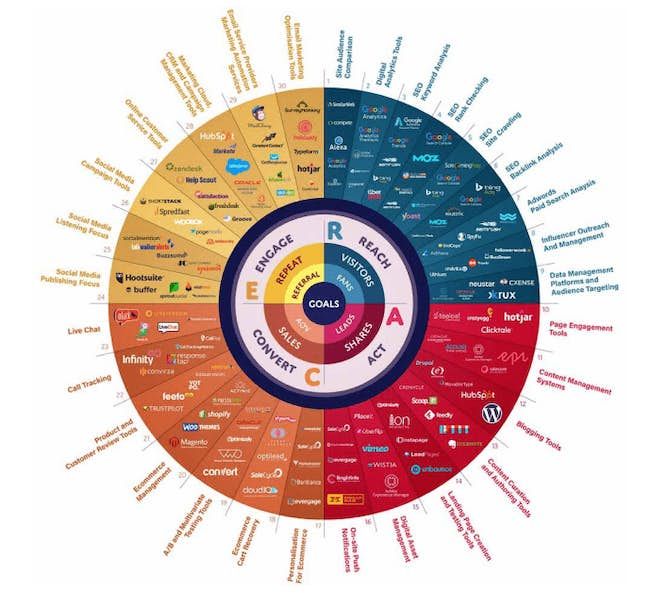The difference between a good and a great digital marketer can sometimes be hard to determine. While certifications, education, and training look great on a resume, soft skills are also an important way to differentiate yourself from the rest of the pack. And in a time of great discussion over how AI will impact marketers’ jobs, skillsets, and even careers, it’s good to remember that soft skills are the most human skills of all!
Many key digital marketing qualities aren’t learned in a set amount of time; instead, they’re innate or cultivated through years of hard work and experience. Here are 9 soft skills you need to drive your digital marketing career forward. If you don’t have these skills now, don’t be discouraged; we’ll provide tips on how to cultivate them over time.
1. Intuition
You may be thinking, “OK, you either have intuition or you don’t.” But fear not, great intuition can be gained through experience!
As a marketer, you won’t always have the data you need. When you don’t have the information you need to support your decisions, you often have to make ones based on your gut. In these situations, it doesn’t benefit you to fear the unknown; you must trust your intuition.
If you have a deep understanding of your customers and industry, your ‘intuition’ becomes more than just a guess – it’s based on real knowledge and experience. Don’t worry if your ideas fail a few times; it happens. Instead, learn from your mistakes, and know that your intuition power will grow over time.
2. Curiosity
As a skill, curiosity is not a ‘nice-to-have’, it’s a necessity for digital marketers.
Marketing as a discipline is constantly changing, and every digital marketer needs to have the interest, passion, and hunger to ask questions and learn more about new marketing techniques, tools, and methods.
For example, if you were an SEO expert in 2018 and you haven’t learned anything new since then, you would no longer be considered brilliant in this field. Your knowledge will be outdated. The same would be true whether you’re a content marketer or social media manager.
To stay up-to-date on all the latest marketing news and trends, you could use an aggregator AI application such as Feedly (shown below) to track your favorite online marketing publications. Then take ten minutes a day to read the articles you find most interesting.

3. Social & Communication Skills
Humans are social beings. This means we have many ways to communicate with each other over and above just talking. We also use non-verbal ways such as gestures, body language, and our personal appearance. It’s about being emotionally intelligent so you can manage your own reactions and emotions and also be mindful of others.
Working in a digital marketing team without solid social and communication skills can be a disaster. It’s vital that every team member, from content marketing to social media, lead generation, product marketing, and design, works together to meet overarching goals.
Working alone without communicating well with others won’t yield the best results for you or your company. In addition, as a marketer, you need social skills to understand how individuals communicate with one another so you can understand the customer journey, drive engagement and create engaging content.
4. Persuasion
Marketing is all about persuading people to buy a product, so it makes sense that great marketers would have this skill in abundance. Persuasion means you have the ability to align yourself with executive goals without compromising on what you think is right for the brand.
Let’s say you are putting together a project brief for your team. Senior Training Consultant, Kevin Reid has some effective persuasion techniques to get team members to accept your proposal:
- Grab their attention from the beginning – Ope with a surprising statistic or a thought-provoking anecdote
- Actively listen to your audience – Listen to what is said and view them with interest and curiosity
- Use pauses – Pause after making an important point to give impact to your pitch and also to allow for questions or comments (2 seconds is a good rule of thumb)
- Be sincere and honest – Nobody likes to be misled, so make sure you can stand by everything you say and answer questions about it
- Close with flair – Remember the last thing you say in your pitch is probably the first thing they will remember
Don’t give up if you fail in your persuasive techniques; remember that marketing is about experimentation, and not everything you try will work the first time. When you persuade others, be sure to base your arguments on logic – not just on your feelings alone.
5. Analytical Skills
Intuition and persuasion skills are important, but backing up what you’re saying is also crucial. When you can, leveraging analytics can really help you make your case for any campaign or strategy.
Analytical skills can range from being able to set up and understand the output of social media campaigns, lead management systems, Google Analytics 4, and many other programs. But from a ‘soft skill’ perspective, you should also be able to interpret these analytics, to generate actionable insights.
This is a skill that doesn’t come naturally for some people so if you’re weak in this area, it’s time to practice. You can get guidance and tips from expert walkthroughs (like this one on Excel) or our webinar with Clark Boyd on data visualization.
6. Get Comfortable with Technology
Digital marketers must be comfortable with technology; it’s a crucial part of the job description. It would be difficult to run any digital campaign without a good understanding of the key tools required, not least due to the myriad of AI tools now in use.
From analytics tools to social media, Microsoft Office, project collaboration tools, and more, technology is an inescapable part of digital marketing. But there are a lot of tools and platforms out there, so you need to identify the ones that you need to excel in your role.
For example, let’s say you’re a social media marketer. You can use tools for scheduling, social listening, or content creation. The key is to do some research and see what tools will make your life easier and do exactly what you need. Often, there are free trials for you to see what the platform offers or read reviews from other marketers.

7. Adaptability
Successful digital marketers always work to keep themselves relevant in the industry. This means they have the ability to adapt and change – even if that means moving away from (or editing) tactics that they have used for years.
The end result of any change should be to better meet the needs of your customers and prospects, and these needs may change every year. Holding onto the same strategies, tactics, and beliefs doesn’t serve any marketer or business well.
Just think about how quickly algorithms – social media and search engines – change. Every tweak to an algorithm means that your content may go from the #1 ranking on Google to page 2 in the blink of an eye. Or an infographic you relied on for driving traffic is downgraded in favor of video content.
You need to be willing to unlearn what you ‘know’ and make mistakes, then remember to learn from them! Don’t be afraid of change or new things, and keep moving.
8. Multitasking
As a digital marketer, it’s unlikely you’re ever working on just one project at a time. This job is all about multitasking, so practice building your skills in this area.
Many marketers wear a lot of hats, especially on small teams where you need to be able to dip in and out of various specialties. In the morning you could be creating the social media content for the week while in the afternoon you need to analyze customer data to segment the audience for a new campaign.
In addition to multitasking, you’ll need to prioritize the most important duties. Ask yourself what will make the largest impact on the business, and do that first. You should also think about time management. Strategies according to Reid you can use to save and create time are:
- Set time limits
- Resist the temptation to do small things first
- Create a task list and use sub-tasks
- Batch tasks (collate similar tasks to improve workflow)
- Use color to prioritize tasks
- Include timelines
- Delegate
- Avoid procrastinating
9. Creativity
What’s a marketer without creativity? Just because the ‘Mad Men’ days of advertising are over doesn’t mean it’s not important to truly connect with potential customers via creative copy and images. Just sending any message or sharing any stock image isn’t enough to differentiate your brand from its competitors.
The competition is fierce online, and great creative is what makes the difference between your content being ignored and being clicked on. Practice being more creative by brainstorming ideas and images and putting them into action.
7. Adaptability
Successful digital marketers always work to keep themselves relevant in the industry. This means they have the ability to adapt and change – even if that means moving away from (or editing) tactics that they have used for years.
The end result of any change should be to better meet the needs of your customers and prospects, and these needs may change every year. Holding onto the same strategies, tactics, and beliefs doesn’t serve any marketer or business well.
Just think about how quickly algorithms – social media and search engines – change. Every tweak to an algorithm means that your content may go from the #1 ranking on Google to page 2 in the blink of an eye. Or an infographic you relied on for driving traffic is downgraded in favor of video content.
You need to be willing to unlearn what you ‘know’ and make mistakes, then remember to learn from them! Don’t be afraid of change or new things, and keep moving.
8. Multitasking
As a digital marketer, it’s unlikely you’re ever working on just one project at a time. This job is all about multitasking, so practice building your skills in this area.
Many marketers wear a lot of hats, especially on small teams where you need to be able to dip in and out of various specialties. In the morning you could be creating the social media content for the week while in the afternoon you need to analyze customer data to segment the audience for a new campaign.
In addition to multitasking, you’ll need to prioritize the most important duties. Ask yourself what will make the largest impact on the business, and do that first. You should also think about time management. Strategies according to Reid you can use to save and create time are:
- Set time limits
- Resist the temptation to do small things first
- Create a task list and use sub-tasks
- Batch tasks (collate similar tasks to improve workflow)
- Use color to prioritize tasks
- Include timelines
- Delegate
- Avoid procrastinating
9. Creativity
What’s a marketer without creativity? Just because the ‘Mad Men’ days of advertising are over doesn’t mean it’s not important to truly connect with potential customers via creative copy and images. Just sending any message or sharing any stock image isn’t enough to differentiate your brand from its competitors.
The competition is fierce online, and great creative is what makes the difference between your content being ignored and being clicked on. Practice being more creative by brainstorming ideas and images and putting them into action.
Sharpen your digital marketing skills
Successful digital marketers know that it’s important to have digital marketing skills that you can build on. The Digital Marketing Institute’s Professional Diploma in Digital Marketing is designed to give you the skills required to devise, implement and measure a campaign across any digital channel. A certified course, it will give you the credibility you need to compete and succeed in the industry guided by experts with years of real-life experience. Enroll today to get your career on track.
